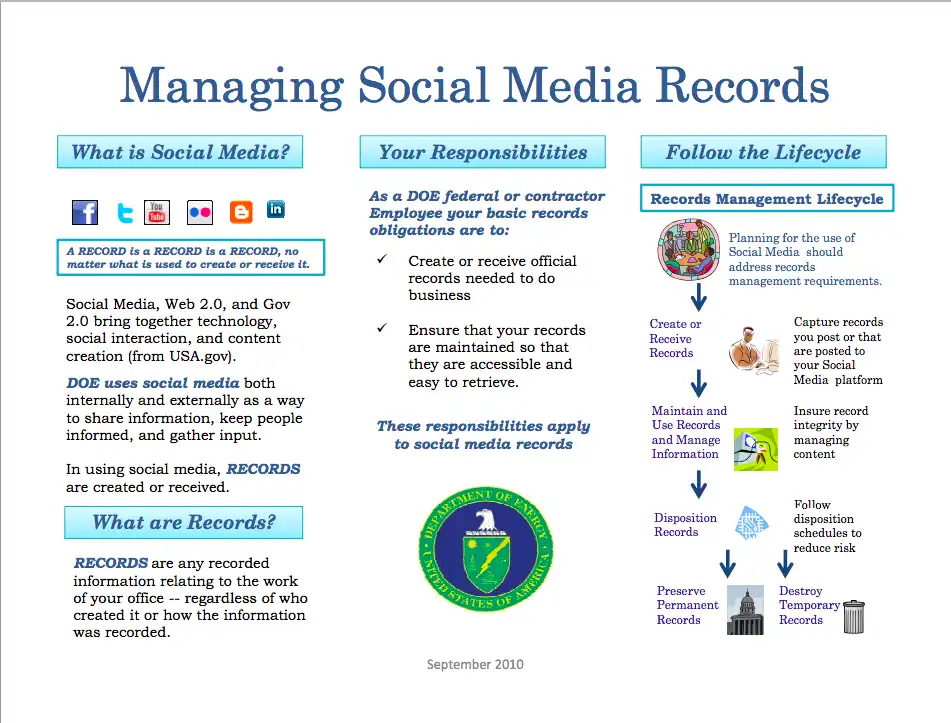Public Records Laws and Social Media Retention in
Federal Agencies
Federal Agencies & Social Media
The Freedom of Information Act (FOIA) was enacted by Congress in 1966 to ensure public access to the records generated by the Federal government and agencies. The law has undergone continual improvement during the past half century to keep pace with the way governments act and communicate, and the ways in which records are generated. In 2011, President Obama issued a memorandum that initiated an effort to update records management policies and practices to better incorporate 21st century records, including social media.
View Memorandum Text
Presidential Memorandum — Managing Government Records (abridged — see Resource Links for full text)
Section 1. Purpose. This memorandum begins an executive branch wide effort to reform records management policies and practices. Improving records management will improve performance and promote openness and accountability by better documenting agency actions and decisions.
(b) Within 120 days of the date of this memorandum, each agency head shall submit a report to the Archivist and the Director of the Office of Management and Budget (OMB) that:
(i) describes the agency’s current plans for improving or maintaining its records management program, particularly with respect to managing electronic records, including email and social media, deploying cloud based services or storage solutions, and meeting other records challenges;
Guidelines from the National Archives and Records Administration (NARA) on Social Media as Public Records
Social media records of Federal agencies may be considered records under the Freedom of Information Act. According to a recent bulletin issued by the National Archives, “[s]ocial media allows individuals to collaborate, create, organize, edit, comment on, combine, and share content, likely resulting in the creation of Federal records.
View Bulletin text
Agencies and departments are encouraged to use Social Media technologies to engage their customers and employees where appropriate. Many state entities, including the Governor’s office, have used Social Media communication with great success
Excerpt from: NARA Bulletin 2014-02. To read the full bulletin, please visit the link listed under “Resources”
October 25, 2013
TO: Heads of Federal Agencies
SUBJECT: Guidance on managing social media records
EXPIRATION DATE: October 31, 2016
3. What are social media records?
Social media allows individuals to collaborate, create, organize, edit, comment on, combine, and share content, likely resulting in the creation of Federal records. The Federal Records Act (44 U.S.C. 3301) defines Federal records as any material that is recorded, made or received in the course of Federal business, regardless of its form or characteristics, and is worthy of preservation. Social media content that meets this definition must be managed according to the applicable laws and regulations.
The statute and its implementing regulations place responsibility with each agency to determine what Federal records they create or receive. Refer to 36 CFR, Chapter XII, Subchapter B, for guidance on how agencies should apply the statutory definition of Federal records.
The following non-exhaustive list of questions will help agencies determine record status of social media content:
- Does it contain evidence of an agency’s policies, business, or mission?
- Is the information only available on the social media site?
- Does the agency use the tool to convey official agency information?
- Is there a business need for the information?
If the answers to any of the above questions are yes, then the content is likely to be a Federal record. Also, social media content may be a Federal record when the use of social media provides added functionality, such as enhanced searchability, opportunities for public comment, or other collaboration. A complete Federal record must have content, context, and structure along with associated metadata (e.g., author, date of creation). The complete record must be maintained to ensure reliability and authenticity.
Federal Social Media Records Management in Practice
Two examples of how federal agencies are managing social media records for FOIA come from the Department of the Interior and the Department of Energy. The Department of the Interior has a comprehensive social media policy that explicitly addresses social media as public records under FOIA. The Department of Energy recognized that, “a record is a record is a record,” including social media, as early as 2010.
View DOI's Social Media Policy View and DOE's infographic on social media records
Department of the Interior Social Media Policy (excerpt: click link for full text)
Records Management, Retention, and Archiving
When using electronic media, whether it is a blog, a Web site, a wiki, e-mail, or any other type of electronic communication, the regulations that govern proper management and archival of records still apply. DOI users, working with the Records Management Officer, determine the most appropriate methods to capture and retain records on both government servers and technologies hosted on non-Federal hosts. The National Archives and Records Administration offers resources and guidance to agencies to ensure proper records management.
DOI and bureaus will need to work with the Records Management Officers to determine the proper records maintenance schedules and dispositions for content posted on third-party Web sites.
Department of Energy: Managing Social Media Records
